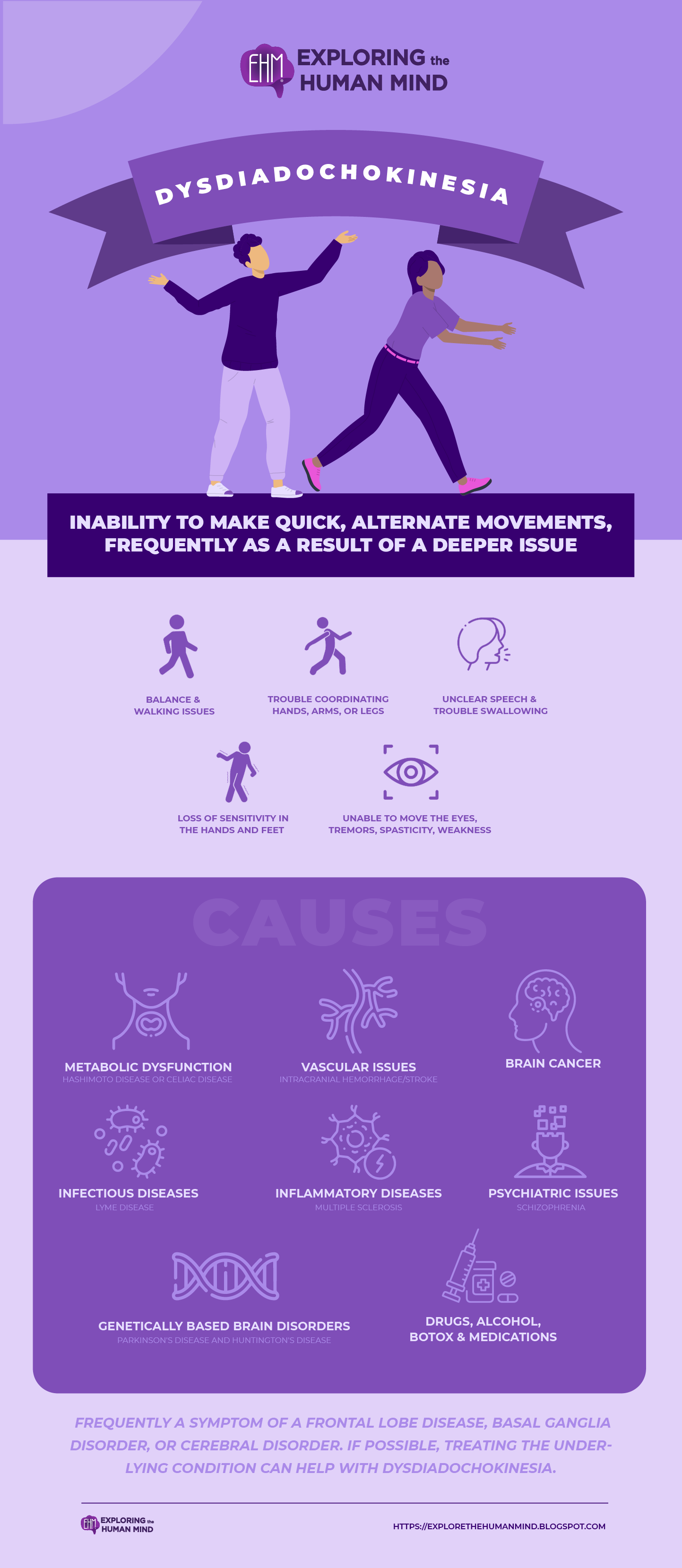Dysdiadochokinesia
Symptoms
DDK typically affects the larynx, which controls speech, as well as the muscles in the arms, hands, legs, and feet. Dysdiadochokinesia is a sign of ataxia, a group of neurological conditions. Ataxia patients may exhibit any of the following signs:
- balance and walking issues, including slowness or awkward movements
- having trouble coordinating your hands, arms, or legs
- speech that is unclear or incomprehensible and trouble swallowing
- it is challenging to stop one movement and begin another one in the opposite direction
- unable to move the eyes, tremors, spasticity, weakness, and loss of sensitivity in the hands and feet
Causes
Dysdiadochokinesia is understood to frequently result from lesions in the cerebellum, a region of the brain that regulates voluntary muscle movements, posture, and balance. Hypotonia, or a loss of muscle tone, brought on by cerebellar damage can also be a factor in the issue.
There are a number of acquired conditions that have an effect on the cerebellum, such as those that cause metabolic dysfunction (like Hashimoto disease or celiac disease), vascular issues (like intracranial hemorrhage or stroke), brain cancer, infectious diseases (like Lyme disease), inflammatory diseases (like multiple sclerosis), or psychiatric issues (like schizophrenia). Furthermore, the cerebellum may be affected by genetically based brain disorders like Parkinson's disease and Huntington's disease.
Toxins from illicit drugs, alcohol, and botulinum toxin (Botox) as well as some medications, including barbiturates and sedatives, can also cause DDK. The risk of developing cerebellar dysfunction can also be increased by vitamin B, E, and thiamine deficiencies.
Additionally, a gene mutation that affects neurotransmitters—the chemicals that transmit information throughout our body and brain—can be linked to dysdiadochokinesia.
Diagnosis
A doctor will ask the patient to complete several straightforward tasks that call for quick, alternating movements in order to test for dysdiadochokinesia. The muscles that any cerebellar lesions affect will determine how well the patient can perform. Common tests involve having the patient quickly turn their hand over on a hard, flat surface several times. Additionally, the patient might be instructed to touch his or her nose before swiftly touching the doctor's finger.
Another common dysdiadochokinesia diagnostic test is turning a doorknob.
Once dysdiadochokinesia is suspected, the physician may order additional tests to identify the underlying disease. Dysdiadochokinesia is frequently a symptom of a frontal lobe disease, basal ganglia disorder, or cerebral disorder. If possible, treating the underlying condition can help with dysdiadochokinesia.
A lesion is usually diagnosed through imaging studies like magnetic resonance imaging (MRI).
Treatment
There are currently no specific treatments for dysdiadochokinesia or cerebellar ataxia that are supported by scientific research, making them difficult conditions to treat. According to a 2014 Journal of Neurology study, physical therapy and occupational therapy may be somewhat advantageous. Speech therapy might also be required. Strength training, balance drills, treadmill walking, and exercises to strengthen the core may all be beneficial.

vectors by Freepick; graphic design by Vadot
Reference:
Dysdiadochokinesia: Definition, Description, Causes. (2016). MediGoo - Health Medical Tests and Free Health Medical Information. https://www.medigoo.com/articles/dysdiadochokinesia/
MS Symptoms That Can Affect Balance and Speech. (2022). Verywell Health. https://www.verywellhealth.com/dysdiadochokinesia-in-ms-2440863
Dysdiadochokinesia: What Is It, Causes, Diagnosis, Treatment, and More | Osmosis. (2019). Osmosis. https://www.osmosis.org/answers/dysdiadochokinesia






Comments
Post a Comment